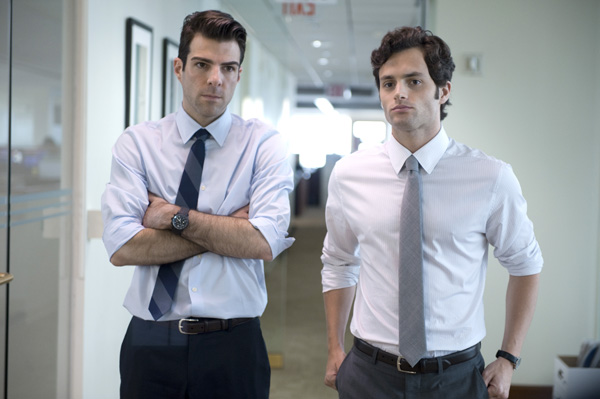
Zachary Quinto and Penn Badgley (Photo: Roadside Attractions)
Written and Directed by J. C. Chandor
Produced by Michael Benaroya, Neal Dodson, Zachary Quinto, Robert Ogden Barnum, Corey Moosa & Joe Jenckes
Released by Lionsgate/Roadside Attractions
USA. 105 min. Rated R
With: Kevin Spacey, Paul Bettany, Jeremy Irons, Zachary Quinto, Penn Badgley, Simon Baker, Mary McDonnell, Demi Moore & Stanley Tucci
Debut writer/director J.C. Chandor brings together a sterling ensemble to personalize the different departments of a 107-year-old investment firm united only by an elevator in its glass skyscraper, which gleams against the New York City skyline—that and the crisis that could bring them all down. It is a tumult very much like what nearly toppled the world’s financial system in the fall of 2008, which still reverberates politically and economically. In the opening scene, the risk management department is being decimated, including the seething chief risk officer (Demi Moore), much like in actual companies where female whistleblowers were dismissed first as scapegoats. And after having been pressured to approve complex financial products, Eric (Stanley Tucci) is led out of the building by security, despite 19 years with the company.
But Eric manages to sneak a flash drive with alarming projections to his underling, Peter (Zachary Quinto), a 28-year-old PhD engineer who had been tempted to work on Wall Street “to change numbers into money.” Just as Eric had mentored him, Peter guides Seth (Penn Badgley), a 23-year-old newly hired junior analyst. From Eric’s data, Peter figures out that the firm’s investment portfolio is dangerously full of rapidly deteriorating assets. (These Wall Street alarms are never linked to the mortgage woes on Main Streets.)
Through a long night (and an unnecessary and stereotypical stop at a strip joint), Peter brings his analysis to Sam (Kevin Spacey), who has risen to head the trading department. He’s been the loyal salesman, faithfully hawking the firm’s products for 34 years, trusting in their soundness when marketing them to clients, who, in turn, trusted him, even when he didn’t understand how they were constructed. (He keeps asking Peter to explain the problem to him “in English.”) As everyone worries about their jobs and/or severance packages, Sam remains the soul of the film (to maximize sympathy for him, even his dog is dying). Representing the consumer in the securities markets, Sam seems quaintly old-fashioned in caring about his reputation. His character is somewhat inspired by Chandor’s father’s long career with Merrill Lynch, a firm which ended up being taken over during the recent turmoil.
The implications of white-collar crime rise as higher up executive Jared (Simon Baker) is brought in and orders Sam to unleash the fire sale on shares. Occupying the top floor, wily CEO John Tuld (Jeremy Irons) is intentionally named for two chiefs, whose manipulative actions contributed to the fall of their companies, Merrill Lynch’s John Thain and Lehman Brothers’ Dick Fuld. (Even though Charles Ferguson’s documentary Inside Job on the financial crisis avoided pointing blame at these two, Curtis Hanson’s docudrama Too Big to Fail this year on HBO had no such qualms.) Hour by hour over this 24 hour period, the tension builds as to who will give in to what ethical lapses and how each will face the future. It is clear that the higher the floor, the larger the golden parachute to soften the landing. The surprisingly humanistic drama dramatically shows that the shouts of the Occupy Wall Streeters need to reach the top.






Leave A Comment